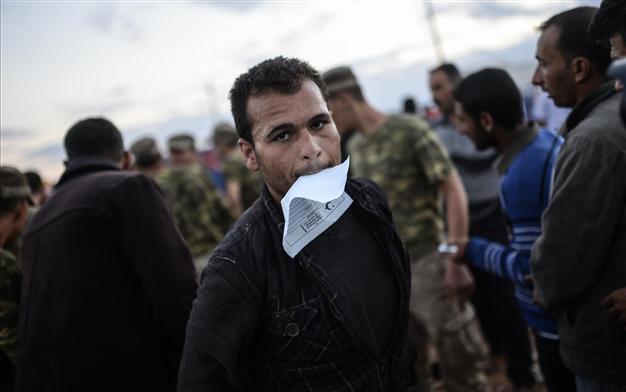Turkish gov’t to provide temporary ID cards for employment of Syrian refugees
ANKARA

Turkey is planning to issue work permits to Syrian refugees to allow their legal employment. AFP Photo
With Turkey struggling to meet the basic needs of around 1.7 million Syrian refugees, the government is now planning to issue temporary identity cards for Syrians in order to allow their employment within a legal framework.The announcement of the plan came from Labor and Social Security Minister Faruk Çelik late on Nov. 11, while responding to questions from lawmakers during ongoing debates over the 2015 Central Governance Budget Law at Parliament’s Planning and Budget Commission.
“Now, there is the need for a decision by the Cabinet,” Çelik said, recalling earlier preliminary studies for the employment of Syrian refugees that were drafted by the Directorate General of Migration Management working under the Interior Ministry.
“They will be given a temporary identity card,” Çelik said, adding that their study outlined the employment of Syrian refugees in “vacant positions” and stressed that the proportion of Syrian refugee laborers at any work place must not be higher than 10 percent.
Whether such a limitation will ease widely held concerns about the employment of Syrian refugees as a form of cheap labor remains to be seen.
Çelik underlined that they have been studying the 10 percent limitation arrangement with “a very careful and technical” method.
“There are vacant positions in all provinces where there is difficulty in supplying the labor force. This study is related to this [situation]. I want to state that we are looking for a solution that will not have an impact on our own country’s people’s response to the current labor force demand,” he added.
Turkey does not call the arrivals from Syria “refugees” in official parlance, as most do not have official refugee status. Instead, they are known as “guests” and the refugee camps are referred to as “tented cities.” Nevertheless, the Turkish government has implicitly acknowledged that many Syrian refugees are likely to remain permanently in the country.
A number of civil society organizations have suggested that the emergence of discrimination and xenophobia in Turkish society against Syrian refugees has been exacerbated by the government’s failure to implement any long-term strategy to deal with them, despite all its hospitality.
















